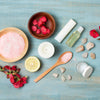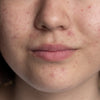How Nutrition Impacts Your Skin's Health and Radiance

When it comes to achieving glowing and radiant skin, what we eat is just as impactful as our skin care routine. Nourishing your skin from just the outside without focusing on the inside is of no use. Including the right nutrients and foods into your diet can lead to remarkable results. Hence, this guide attempts to give an overview of the science behind your diet’s relation to healthy skin and why what you eat can be the ultimate game changer for radiant skin.
The Link Between Nutrition and Skin Health
The skin is the body’s largest organ, and like any other part of you, it needs essential vitamins and minerals to function at its best. But unlike other organs, the effects of nutrition on the skin are visible. A balanced, nutrient-rich diet can boost skin elasticity, reduce signs of ageing, improve hydration, and even help with specific skin conditions.
Healthy skin diet isn’t just about beauty; it’s also about ensuring your skin remains strong and resilient against environmental aggressors like pollution, UV rays, and stress. So, how does food impact skin, and what nutrients should we focus on?
Dietary Habits and Skin Issues
Dietary habits play a crucial role in influencing skin health since poor nutrition often leads to various skin issues.
For instance, a diet high in inflammatory foods, high in processed foods, refined sugars, and trans fats contribute to inflammation, which disrupts the skin’s natural balance. This often shows up in the form of skin conditions like acne, eczema, and psoriasis. Adopting an anti-inflammatory diet filled with fruits, vegetables, whole grains, and omega-3-rich foods like fish and flaxseeds can help reduce inflammation and ease these skin conditions.
Eczema, which causes dry and itchy skin, specifically, can sometimes be linked to food sensitivities or allergies. Common triggers include dairy, eggs, and gluten. For those affected, identifying and removing these trigger foods from their diet can be a key step in managing symptoms, leading to more comfortable, clear skin.
For acne-prone individuals, dairy might be a dietary factor worth monitoring. Some studies suggest that hormones and bioactive molecules in dairy products can increase sebum production and inflammation, two key factors in acne development. By reducing or eliminating dairy, some individuals find improvements in their skin’s appearance and reduced breakouts.
Moreover, a diet high in sugar can accelerate skin ageing due to the formation of advanced glycation end products (AGEs). These compounds are formed when sugar binds to proteins like collagen and elastin, which are responsible for skin’s firmness and elasticity. AGEs weaken these proteins, leading to sagging, fine lines, and a loss of youthful resilience in the skin. Reducing sugary foods and drinks can help minimise AGEs, giving the skin a better chance to retain its smooth, firm appearance.
Key Vitamins
Several vitamins play significant roles in promoting healthy skin and helping repair the skin. Let’s explore which ones top the list and why they’re essential.
1. Vitamin A: The Skin Healer
Vitamin A is often called the ‘skin vitamin’ because it has powerful antioxidant properties and plays a crucial role in skin health. It promotes cell turnover, which means it helps the skin shed old, dead cells, revealing fresh, youthful skin. It’s also crucial for collagen production and can reduce the appearance of wrinkles and fine lines.
2. Vitamin C: The Brightening Star
Vitamin C is a popular ingredient in skin care products, but consuming it can be equally beneficial. It is known for its brightening and collagen-boosting abilities, Vitamin C can lighten dark spots, even out skin tone, and improve elasticity.
3. Vitamin E: The Moisturizer
Vitamin E is a powerful antioxidant that helps combat oxidative stress and keeps your skin hydrated. This nutrient works to lock in moisture, making the skin appear smooth, soft, and healthy. It also protects skin cells from environmental damage, preventing premature ageing.
4. Zinc: The Skin Repairer
Zinc is an essential mineral that’s often overlooked but plays a vital role in skin regeneration. Zinc aids in wound healing and is essential for combating acne and inflammation. It’s also a strong antioxidant that can repair and protect the skin.
5. Omega-3 Fatty Acids: The Skin Barrier Builder
Omega-3 fatty acids, commonly found in fish and flaxseeds, are essential fats that benefit the skin in multiple ways. These fatty acids strengthen the skin’s natural barrier, locking in moisture and keeping out irritants. They also reduce inflammation, which can be helpful for conditions like eczema.
Putting Together Your Skin-Boosting Diet
Now that you know which nutrients are essential, let’s talk about what foods to incorporate into your daily routine for that healthy skin glow, especially foods native to Pakistan.
1. Leafy Greens
Leafy greens like spinach and fenugreek leaves (methi) are not only rich in vitamins A, C, and E, but they also contain phytonutrients that help protect the skin from sun damage. Whether in salads, smoothies, or in traditional dishes, greens can support collagen production and improve elasticity.
2. Fruits
Pomegranates can offer powerful anti-inflammatory and antioxidant properties. They are high in vitamin C and ellagic acid, which help brighten the skin, fight free radicals, and support cell repair. Consuming pomegranate seeds or drinking freshly made anaar juice can enhance your skin’s natural glow.
Another local favourite, mangoes are rich in vitamin A, which helps with skin cell turnover and repairs sun-damaged skin. Mangoes also have beta-carotene and vitamin C, which support an even skin tone and promote a healthy glow. Consuming mangoes during the summer season can nourish the skin from within.
3. Nuts and Seeds
Walnuts, almonds, flaxseeds, and pumpkin seeds are widely available and rich in omega-3s, antioxidants, zinc, skin-loving vitamins, and carry anti-inflammatory properties, all of which support skin hydration and elasticity. Sprinkling them into yoghurt, oatmeal, or salads can add a nutrient boost and enhance your skin’s natural glow.
4. Fish
In Pakistan, fish like rohu, trout, and hilsa are popular and provide a rich source of omega-3 fatty acids, which are essential for keeping skin hydrated and reducing inflammation. Omega-3s help strengthen the skin barrier, improve elasticity, and reduce redness and acne. Consuming fish regularly, especially grilled or baked, can promote a smoother, healthier complexion.
5. Sweet potatoes
Sweet potatoes, a winter favourite, are rich in beta-carotene, which the body converts into vitamin A—a nutrient essential for skin renewal and glow. They can reduce cell damage from sun exposure and enhance your skin’s resilience against ageing.
6. Clarified Butter (Desi Ghee)
Desi ghee, when consumed in moderation, provides essential fatty acids that nourish and moisturise the skin. The healthy fats in ghee help strengthen the skin barrier, keeping it hydrated and plump. Adding a small amount of ghee to your meals or using it to cook vegetables can be beneficial for those with dry skin.
Practical Tips for Healthy Skin
Achieving healthy, radiant skin often begins with nourishing dietary and lifestyle habits. Alongside making small adjustments, and diversifying your palate,there are a few practical tips that can even further enhance your skin.
Hydration is often overlooked, but it is essential for maintaining skin’s elasticity and suppleness. Drinking enough water throughout the day, and incorporating foods high in water content like watermelon, cucumber, and oranges, or including herbal teas can help keep your skin plump and refreshed.
Processed foods, often high in sugar and unhealthy fats, can lead to inflammation and accelerate skin ageing. Instead, opt for the nutrient-dense foods suggested above to provide your skin with the nutrients it needs.
Chronic stress can take a toll on your skin, potentially causing breakouts or worsening conditions. Practising mindfulness, meditation, yoga, or deep breathing can help reduce stress levels, promoting both skin health and overall well-being.
Skin Care Tips Alongside
While nutrition is foundational for glowing skin, a consistent skin care routine is the perfect complement to maximise these benefits.
- Cleanse and Moisturize: Wash with a gentle cleanser like the Clariderm Anti-Acne Face Wash to remove impurities, then lock in moisture with a hydrating cream, such as the Hydra FX Moisturising Cream. This helps the skin retain nutrients and stay healthy.
- Exfoliate: Slough off dead skin cells weekly with a gentle exfoliator, helping your skin to look fresh and allowing it to absorb nutrients more effectively.
- Sunscreen: Protect your skin from harmful UV rays with sunscreen, which prevents signs of ageing and keeps your skin looking radiant. The Solero Sunblock SPF 100 is an ideal choice that offers such broad-spectrum protection.
Wrapping Up
The relationship between nutrition and skin health is real and scientifically supported. A healthy skin diet full of vitamins, antioxidants, and essential fatty acids can significantly improve the look and feel of your skin by repairing it. While skincare products can enhance your glow, do not underestimate the power of whole foods and balanced nutrition.
Eating a variety of nutrient-dense foods like leafy greens, berries, nuts, and fish can give you that natural glow by providing you with the vitamins and minerals it needs to thrive. Check out to get products to nourish your skin from the outside and the inside and enjoy the journey to radiant, healthy skin!
-
Posted in
skincare guide, Skincare Tips





